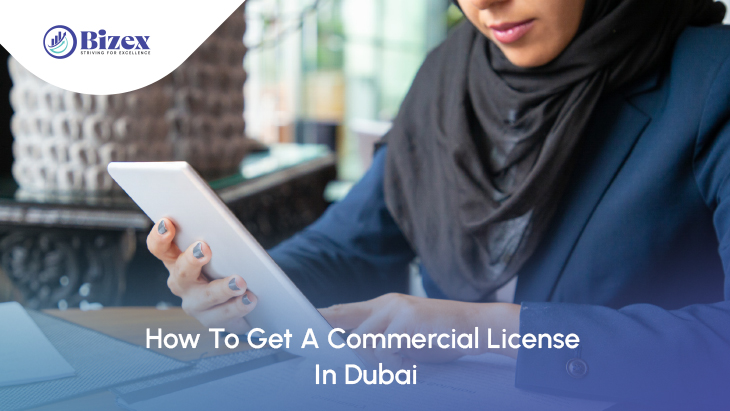Dubai has become a premier destination for entrepreneurs and multinational companies seeking to capitalise on a tax-friendly business environment, modern infrastructure, and global connectivity. For anyone looking to engage in trade, whether it's opening a retail outlet, importing and exporting goods, or launching an online store, a commercial license is a must-have legal requirement in the UAE.
This in-depth guide explores the entire process of obtaining a commercial license in Dubai, providing essential details on business activity selection, legal structure, jurisdiction, documentation, costs, and ongoing compliance. Whether you're a first-time entrepreneur or an experienced investor, this blog will help you navigate the process with confidence. The information is also useful for anyone exploring company formation services in Dubai for establishing a sustainable trading business.
Understanding Commercial Licenses
What is a Commercial License?
A commercial license is a legal permit issued by the Department of Economic Development (DED) or relevant free zone authority that allows a business to engage in commercial or trading activities. These activities range from buying and selling physical goods to providing logistics and brokerage services. Without this license, operating a business in Dubai is illegal.
Types of Commercial Licenses in Dubai
There are several categories of commercial licenses available:
• General Trading License: This allows you to trade in a wide variety of unrelated goods. It's suitable for businesses looking to diversify their offerings across sectors.
• Specific Trading License: This license is limited to a particular category of goods, such as electronics, clothing, or auto parts.
• E-commerce License: Designed for businesses operating online, this includes dropshipping, affiliate marketing, and digital retail stores.
Understanding which type fits your business plan is crucial, as it impacts your market reach, operational structure, and regulatory obligations.
Commercial vs Professional vs Industrial Licenses
• Commercial License: Best suited for trading and general business activities.
• Professional License: Ideal for individuals offering professional services like consulting, legal, or design.
• Industrial License: Needed for businesses involved in manufacturing, production, or assembling goods.
Choosing the right type of license ensures your company stays compliant with legal standards and operates efficiently.
Choosing the Right Jurisdiction
Mainland, Free Zone, or Offshore?
Dubai offers three jurisdictions for setting up a business:
• Mainland: Regulated by the DED, businesses can operate anywhere within the UAE and internationally. This is ideal for companies targeting both local and global markets.
• Free Zone: These are specialised economic zones offering full foreign ownership, tax incentives, and simplified company setup. However, business activities are typically restricted to within the free zone or international trade.
• Offshore: Primarily used for holding companies, asset management, or international trade. These entities are not allowed to operate within the UAE market directly and don't require a physical office.
Each jurisdiction offers its own set of advantages and limitations. For instance, free zones offer 100% ownership and tax exemptions, but restrict direct trade within the UAE unless you appoint a distributor. Free Zone Company Formation in Dubai is particularly popular among tech and logistics firms for its cost-effective setup.
Deciding on the Business Activity
Selecting the Right Activity
Your chosen business activity affects everything from the license type and external approvals to visa quotas and tax obligations. The DED and free zone authorities maintain comprehensive lists of permissible activities.
Popular activities under commercial licenses include:
• Trading food and beverages
• Selling apparel and textiles
• Import/export of electronics and IT equipment
• Auto parts and machinery trading
Regulatory Approvals
Certain activities require additional approval from regulatory bodies. For example, if you're dealing in food products, you'll need clearance from Dubai Municipality. Healthcare businesses require approval from the Dubai Health Authority (DHA), and real estate firms must be licensed by RERA.
Legal Structures and Ownership Options
Types of Legal Entities
The UAE offers various legal structures, each with specific benefits:
• Sole Establishment: Owned by one individual, usually applicable for professional activities.
• Limited Liability Company (LLC): Most commonly used for commercial licenses, allowing 1–50 shareholders.
• Branch of a Foreign Company: An extension of a parent company located abroad, suitable for global expansions.
• Civil Company: Designed for licensed professionals like doctors, lawyers, or engineers.
• Free Zone Establishment (FZE): One shareholder entity within a free zone.
• Free Zone Company (FZC): Multiple shareholders operating in a free zone jurisdiction.
100% Foreign Ownership and Sponsorship
Thanks to recent legal reforms, many business activities now allow 100% foreign ownership in the mainland without the need for a local sponsor. However, for strategic sectors such as defence or utility services, Emirati sponsorship or a local service agent (LSA) might still be required.
An LSA doesn't own shares but serves as your representative before UAE government departments.
Trade Name Registration
How to Choose and Reserve Your Business Name
Choosing a compliant and memorable trade name is a critical step. Your name should reflect your business activity and align with DED naming rules:
• Avoid offensive or religious terms
• Do not use abbreviations or country names
• Ensure uniqueness to prevent duplication
Once finalised, you can reserve your trade name through the DED portal or authorised typing centres. The reservation is typically valid for six months, and the cost is around AED 620.
Initial Approval Process
What is Initial Approval?
Initial approval is a no-objection certificate issued by the DED indicating they don’t object to your business starting operations. It allows you to proceed with further steps like leasing office space and drafting legal documents.
Documents Required:
• Passport copies of all shareholders
• UAE residence visa or Emirates ID (if applicable)
• Reserved trade name
• Business activity details
Approval typically takes 2–5 working days.
Business Location and Office Requirements
Office Space Requirements
Physical office space is a mandatory requirement for most business setups. The size depends on the number of employee visas and the nature of your activity. For example, each visa typically requires 100 sq. ft. of office space.
Ejari Registration
After securing your office lease, you must register the contract with Ejari (Dubai’s tenancy registration system) under the Real Estate Regulatory Agency (RERA). Ejari is required for the issuance of a final license.
Flexi Desk Solutions
Free zones often offer affordable alternatives like flexi desks or co-working spaces, which fulfill minimum space requirements and also qualify for visa quotas.
Drafting MOA or LSA Agreement
Memorandum of Association (MOA)
The MOA is a crucial legal document for LLCs and other partnership-based entities. It outlines:
• Profit and loss distribution
• Partner responsibilities
• Capital investment
• Management structure
Local Service Agent (LSA) Agreement
For expat-owned professional licenses, an LSA agreement must be drafted. The agent acts as a liaison but doesn’t have any ownership or control over your company.
A public notary in Dubai must notarise these documents and may require attestation from the Ministry of Foreign Affairs if signed outside the UAE.
Final Submission and License Issuance
1. Submitting Your Documents
Once your MOA/LSA, Ejari, and initial approval are ready, submit your final application to the DED along with any additional documents.
2. Payment and Costs
The final payment includes several fees:
• License fee
• Chamber of Commerce registration
• Market fees (typically a percentage of rent)
• Trade name and initial approval charges
3. License Issuance Timeline
Your commercial license is generally issued within 3 to 7 business days post-submission and payment.
Additional Approvals and Permits
External Authority Approvals
Depending on your activity, you may need clearances from additional government bodies:
• Dubai Municipality (Food trading)
• DHA (Healthcare)
• RERA (Real Estate)
• KHDA (Education)
Make sure to factor in the time and cost for these extra permissions.
Corporate Bank Account Setup
Requirements
To open a corporate bank account in Dubai, you’ll need:
• Valid trade license
• MOA/LSA agreement
• Passport and visa copies of shareholders
• Ejari and the tenancy contract
Recommended Banks
• Emirates NBD
• Mashreq Bank
• RAKBANK
• ADCB
• HSBC
Keep all financial records transparent and prepare to explain your business model and funding sources during the bank’s due diligence process.
Visa Processing and Staffing
1. Types of Visas
• Investor Visa: For business owners and shareholders
• Employee Visa: Issued based on office space and activity type
2. Labour and Immigration Steps
• Register with the Ministry of Human Resources & Emiratisation (MOHRE)
• Obtain an establishment card
• Apply for labour contracts and work permits
Visa quotas are linked to your business activity and office size.
Cost Breakdown
1. Estimated Costs
• Name Reservation: AED 620
• Initial Approval: AED 120
• Trade License: AED 10,000 – 30,000
• Office Rent: AED 15,000 – 50,000/year
• MOA/LSA Drafting: AED 1,500 – 3,000
2. Additional Costs
• Visa processing
• Emirates ID and medical test
• Employee insurance
• Bank KYC compliance fees
3. Renewal Costs
Commercial licenses must be renewed annually, with similar costs excluding document drafting unless changes are required.
Best Practices and Final Tips
Avoid Common Pitfalls
• Don’t skip external approvals
• Choose accurate business activities
• Understand office space implications
• Plan finances for hidden costs
Why Use a Business Consultant?
Partnering with consultants like Bizex LLC ensures:
• Accurate documentation
• Time-efficient setup
• Full regulatory compliance
• Strategic advice tailored to your business goals
Conclusion: How Bizex LLC Can Help
Setting up a commercial business in Dubai is an exciting venture, but the process involves multiple legal, financial, and administrative steps. From selecting your activity and jurisdiction to opening a bank account and hiring staff, each phase requires careful planning and compliance.
Bizex LLC simplifies this journey. Our expert consultants provide end-to-end support from business activity selection and document drafting to trade license issuance and visa processing. Whether you're a new investor or looking to expand your global presence, we make setting up in Dubai easy and efficient.
Our specialists also assist with essential compliance tasks such as TAX & VAT Services in Dubai, ensuring that your financial reporting and obligations are managed smoothly and following UAE regulations.
Contact us today to book your free consultation and start your Dubai business with confidence.










 1084
1084 


Leave a reply